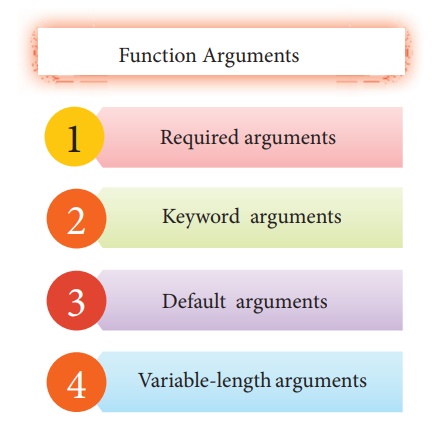Python - Function Arguments | 12th Computer Science : Chapter 7 : Core Python : Python Functions
Chapter: 12th Computer Science : Chapter 7 : Core Python : Python Functions
Function Arguments
Function Arguments
Arguments are used to call a function and there
are primarily 4 types of functions that one can use: Required arguments, Keyword arguments, Default arguments and
Variable-length arguments.

1. Required Arguments
“Required Arguments” are the arguments passed to a function in correct positional order. Here, the number of arguments
in the function call should match exactly with the function definition. You
need atleast one parameter to prevent syntax errors to get the required output.
Example :
def printstring(str):
print ("Example - Required
arguments ")
print (str)
return
# Now you can call printstring()
function
printstring()
When the above code is executed, it produces
the following error.
Traceback (most recent call last):
File "Req-arg.py", line 10, in
<module>
printstring()
TypeError: printstring() missing 1 required
positional argument: 'str'
Instead of printstring()
in the above code if we use printstring
(“Welcome”) then the output is
Output:
Example - Required arguments
Welcome
2. Keyword Arguments
Keyword arguments will invoke the function
after the parameters are recognized by their parameter names. The value of the
keyword argument is matched with the parameter name and so, one can also put
arguments in improper order (not in order).
Example:
def printdata (name):
print (“Example-1 Keyword
arguments”)
print (“Name :”,name)
return
# Now you can call printdata()
function
printdata(name = “Gshan”)
When the above code is executed, it produces
the following output :
Output:
Example-1 Keyword arguments
Name :Gshan
Example:
def printdata (name):
print (“Example-2 Keyword
arguments”)
print (“Name :”, name)
return
# Now you can call printdata() function
printdata (name1 = “Gshan”)
When the above code is executed, it produces
the following result :
TypeError: printdata() got an unexpected keyword
argument 'name1'
Example:
def printdata (name, age):
print ("Example-3 Keyword
arguments")
print ("Name :",name)
print ("Age :",age)
return
# Now you can call printdata() function
printdata (age=25, name="Gshan"
When the above code is executed, it produces
the following result:
Output:
Example-3 Keyword arguments
Name : Gshan
Age : 25
Note
In the above program the parameters orders are
changed
3. Default Arguments
In Python the default argument is an argument
that takes a default value if no value is provided in the function call. The
following example uses default arguments, that prints default salary when no
argument is passed.
Example:
def printinfo( name, salary =
3500):
print (“Name: “, name)
print (“Salary: “, salary)
return
printinfo(“Mani”)
When the above code is executed, it produces
the following output
Output:
Name: Mani
Salary: 3500
When the above code is changed as print
info(“Ram”,2000) it produces the following output:
Output:
Name: Ram
Salary: 2000
In the above code, the value 2000 is passed to
the argument salary, the default value already assigned for salary is simply
ignored.
4. Variable-Length Arguments
In some instances you might need to pass more
arguments than have already been specified. Going back to the function to
redefine it can be a tedious process. Variable-Length arguments can be used
instead. These are not specified in the function’s definition and an asterisk
(*) is used to define such arguments.
Lets see what happens when we pass more than 3
arguments in the sum() function.
Example:
def sum(x,y,z):
print("sum of three nos
:",x+y+z)
sum(5,10,15,20,25)
When the above code is executed, it produces
the following result :
TypeError: sum() takes 3 positional arguments but 5
were given
Syntax - Variable-Length Arguments
def function_name(*args):
function_body
return_statement
Example:
def printnos (*nos):
for n in nos:
print(n)
return
now invoking
the printnos() function
print ('Printing two values')
printnos (1,2)
print ('Printing three values')
printnos (10,20,30)
Output:
Printing two values
1
2
Printing three values
10
20
30
In Variable Length arguments we can pass the
arguments using two methods.
1. Non keyword variable arguments
2. Keyword variable arguments
Non-keyword variable arguments are called tuples. You will learn more about
tuples in the later chapters. The Program given is an illustration for non
keyword variable argument.
Related Topics